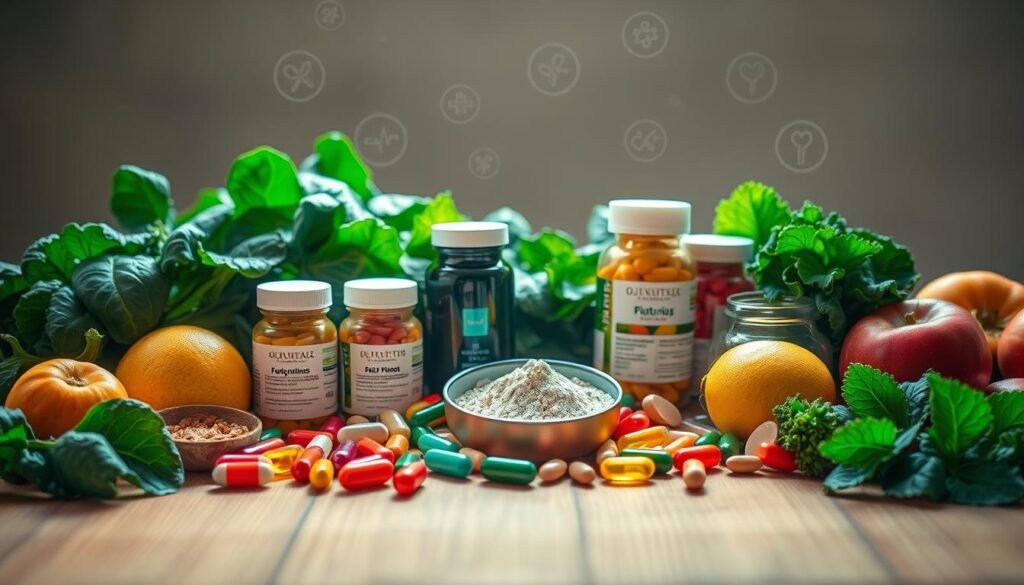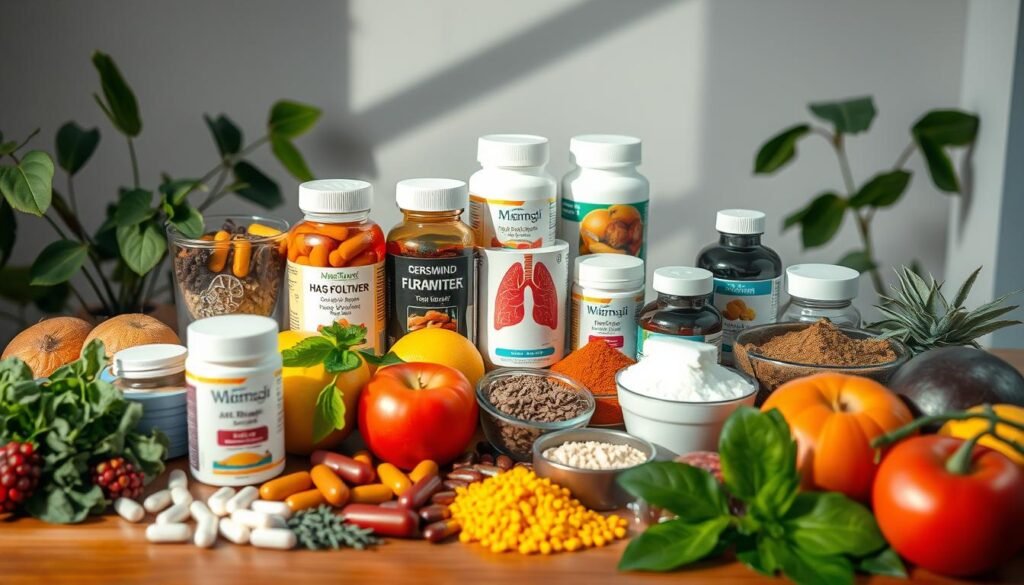Almost half of the people with lung cancer lose a lot of weight during their treatment. This fact shows how important good nutrition is for those dealing with lung cancer. The National Cancer Institute says eating well is key. It helps keep energy up, improves life quality, and can even make treatment more effective. For some, supplements become very important. They provide the nutrients needed during these hard times.
The disease and its treatments make eating right hard. But, focusing on diet is crucial for lung cancer patients. Adding the right supplements can make a big difference. They help ensure the body gets the vitamins and minerals needed to fight cancer. Certain supplements are made just for lung cancer care. They help with eating, taking in nutrients, and staying well.
Key Takeaways
- A significant number of lung cancer patients experience weight loss, affecting their nutritional status.
- Maintaining good nutrition is crucial for enhancing treatment outcomes.
- Supplements for lung cancer patients can provide essential vitamins and minerals.
- Specific lung cancer nutrition supplements can help support appetite and nutrient absorption.
- It is vital to consult healthcare providers before starting any new supplements.
Understanding Lung Cancer and Its Impact on Nutrition
Lung cancer is a major health issue worldwide. It comes in two main types: small cell and non-small cell. Each has different treatments like surgery, chemotherapy, or radiation. These treatments can affect patients’ well-being greatly.
Patients often lose weight, feel tired, and have weaker immune systems. These problems can stem from the cancer and its treatments. They can cause a decline in eating and nutrients. So, a special lung cancer nutrition plan is very important for patients.
Eating right helps fight the bad effects of cancer treatments. Vitamins and minerals make the body stronger. For those who have trouble eating enough, lung cancer supplements are a big help. Knowing how cancer affects eating and nutrients can help patients make good diet choices.
Talking with doctors about using lung cancer supplements is key. This team effort helps create a diet plan that meets each patient’s needs. It aims for better health during the cancer fight.
The Role of Nutrition in Lung Cancer Treatment
The journey through lung cancer treatment often involves more than medicine. Nutrition plays an increasing role in helping patients. It aids in fighting side effects of chemo and radiation. Foods rich in nutrients boost strength and well-being during tough times.
Nutrition helps manage anxiety and depression, which many patients face. Eating well is linked to better quality of life and might increase survival rates. Studies show nutrition before treatment affects cancer survival chances. This means that dietary supplements can help greatly, both physically and emotionally.
Patients need special nutritional plans made for them in cancer care settings. A good nutrition plan includes whole foods and important supplements. It gives the body needed nutrients for recovery and health boost. Key nutrients improve recovery, immune health, and energy. More on nutrition in lung cancer can be found here.
Supplements for Lung Cancer Patients
For lung cancer patients, taking supplements for lung cancer patients is key. These supplements offer vital vitamins and minerals. They help when the patient lacks nutrients due to the illness or side effects of treatments. By customizing dietary supplements for lung cancer according to individual needs, patients can stay strong and enhance their well-being.
Importance of Targeted Nutritional Support
Lung cancer patients face specific nutritional challenges. Their need for nutrients goes up, and treatments may lead to weight loss and malnutrition. By giving focused nutritional support, these issues can be managed better. Supplements like vitamins, minerals, and antioxidants are important. They improve immune health and lower inflammation.
Choosing Safe and Effective Supplements
Picking safe supplements is critical for lung cancer patients. Talking to healthcare professionals helps ensure the supplements work well with treatments. The Oncology Nutrition Dietetic Practice Group recommends choosing supplements carefully. This approach helps avoid bad interactions with drugs and promotes better health outcomes.
| Supplement Type | Potential Benefits | Considerations |
|---|---|---|
| Vitamin D | Supports immune function and may improve treatment response. | Consult with a healthcare provider for appropriate dosage. |
| Vitamin C | Antioxidant properties help reduce oxidative stress. | High doses may interact with chemotherapy. |
| Omega-3 Fatty Acids | May help reduce inflammation and support overall health. | Consider potential blood-thinning effects. |
| Zinc | Supports immune health and recovery. | Excessive amounts can have adverse effects. |
Essential Vitamins for Lung Cancer Patients
It’s crucial for people with lung cancer to eat well. Key vitamins, like Vitamin D and C, are vital. They support health and can make treatment work better.
Vitamin D and Its Benefits
Vitamin D has many benefits for those with lung cancer. It can boost the immune system. This might lead to better results from treatment. People with low Vitamin D levels face more cancer-related issues.
Dietary sources of vitamin D include:
- Fatty fish (like salmon and mackerel)
- Egg yolks
- Fortified dairy products
- Fortified cereals
How much Vitamin D you need varies. Most people should get 600-800 IU a day. But some may need more, depending on health and doctor’s advice.
Vitamin C as an Antioxidant
Vitamin C is crucial as a strong antioxidant. It fights oxidative stress that harms cells. It might help prevent cancer from coming back. Plus, it boosts the immune system, which is key for those with lung cancer.
Sources of vitamin C include:
- Citrus fruits (oranges, grapefruits)
- Bell peppers
- Kale and spinach
- Strawberries
People with lung cancer should aim for 65 to 90 mg of Vitamin C daily. A diet full of fruits and veggies helps meet this goal.

| Vitamin | Benefits | Sources | Recommended Dosage |
|---|---|---|---|
| Vitamin D | Enhances immune function, may improve treatment outcomes | Fatty fish, egg yolks, fortified foods | 600-800 IU per day |
| Vitamin C | Powers antioxidant activity, may reduce recurrence risk | Citrus fruits, bell peppers, leafy greens | 65-90 mg per day |
Natural Remedies for Lung Cancer
Exploring natural remedies for lung cancer offers different ways for patients to find extra support. They look at herbal supplements for potential help during treatment. Turmeric, green tea extract, and astragalus are highlighted for their promising effects.
Herbal Supplements and Their Uses
Turmeric has curcumin, known for fighting inflammation and acting as an antioxidant. It may reduce tumor growth and improve immune response. Green tea extract, with catechins, could stop cancer cell growth and act as a powerful antioxidant. Astragalus supports immune health and might boost vitality for those in conventional treatments.
Integrating Natural Remedies into Daily Life
Adding natural remedies into daily life takes thought. Patients need to talk with doctors before combining these with prescribed treatments. They can add turmeric to meals, drink green tea, or use astragalus supplements. Getting advice helps blend natural remedies into their health routine safely.
Dietary Supplements for Lung Cancer
For those dealing with lung cancer, dietary supplements can be crucial. They help with symptoms, keep energy up, and meet nutritional needs during treatment. Picking the right supplements is important.
Key Supplements to Consider
There are important supplements to think about:
- Omega-3 Fatty Acids: They lower inflammation and are good for the heart.
- Probiotics: Improve digestion and strengthen immunity.
- B Vitamins: Key for energy and might reduce treatment-related fatigue.
- Vitamin E: Helps the immune system and could protect cells.
Adding these can help lung cancer patients feel better. They improve energy and fight side effects of treatments.
Consulting with Healthcare Providers
Talk to healthcare providers before adding supplements. They can suggest what’s best based on health and treatment. This ensures supplements don’t clash with current treatments. Working together promotes overall well-being during care.

| Supplement | Benefits | Considerations |
|---|---|---|
| Omega-3 Fatty Acids | Reduces inflammation | Consult for interactions with medications |
| Probiotics | Aids digestion | Choose strains well-studied in cancer populations |
| B Vitamins | Boosts energy levels | Check existing levels before supplementation |
| Vitamin E | Cells protection | May affect blood clotting; seek advice |
Protein Supplements: Supporting Energy and Recovery
People fighting lung cancer need to keep their energy up and muscle mass strong. Protein is key for these goals. So, protein supplements are a big help in their diets. They make sure you get enough protein, even if you don’t feel like eating much.
There are different kinds of protein supplements. You have whey, plant-based ones, and amino acids. Whey protein is a full protein, which means it has all the amino acids your body needs. It’s easy to digest. Many people use it to fix muscles after working out. Plant-based proteins come from peas, rice, or hemp. They’re great for those who want to stay vegan but still get their protein. Amino acid supplements are good for focusing on certain health goals, like getting better after a workout or building muscle.
- Put protein powder in smoothies or shakes.
- Add high-protein ingredients to soups or stews.
- Use them in baking items like muffins or energy bars.
It’s important to balance how many calories you eat with the protein you need. Hitting your protein target helps keep muscle strong, especially during treatment. These supplements give you the extra nutrients you need for better recovery and energy.
It’s smart to talk to health care professionals about using protein supplements for lung cancer. Everyone’s different, and customized nutritional help is key.
| Type of Protein | Benefits | Considerations |
|---|---|---|
| Whey Protein | Fast absorption, muscle recovery | May cause discomfort in lactose-sensitive individuals |
| Plant-Based Protein | Vegan-friendly, nutritious | May lack some essential amino acids |
| Amino Acid Supplements | Targeted support, flexible | Can be costly, requires mindful dosages |
Best Supplements for Lung Cancer Patients
Choosing the right supplements is key for lung cancer patients. It helps boost overall health and aids in treatment. A personal plan is crucial. This includes looking at individual health needs and how supplements might affect other treatments. Adding the right supplements to your daily plan needs careful thought.
Top Recommendations from Experts
Nutrition experts and cancer doctors suggest different supplements for lung cancer care. Some top picks include:
- Vitamin D: It’s great for bones and helps the immune system.
- Vitamin C: A strong antioxidant that protects your cells.
- Selenium: This mineral boosts the immune system.
- Turmeric: Has anti-inflammatory effects that might help with treatment.
- Bromelain: Comes from pineapples and may lower inflammation.
These supplements can help manage health while treating lung cancer. Always talk to a healthcare provider before starting any lung cancer treatment supplements.
Balancing Supplements with Medical Treatment
Keeping a balance between supplements and lung cancer treatments is important. Some supplements might affect how well chemo or radiation works. Stay in touch with your medical team to safely use supplements alongside your treatment.

A balanced diet and smart supplement choices can improve health for lung cancer patients. This supports not just physical health but also the success of their treatment.
Lung Cancer Support Supplements
Lung cancer support supplements are key in helping patients feel better. They usually have vitamins, minerals, and herbal extracts. These nutrients work together to meet the special needs of those in treatment. They might boost the immune system, raise energy levels, and help with recovery.
Many trusted brands make lung cancer support supplements. It’s good for patients to choose products made just for lung cancer care. This makes sure the supplements are safe and work well. These products might have:
- Vitamin D: Important for immune system function.
- Vitamin C: Known for its antioxidant properties, helping to combat oxidative stress.
- Zinc: Supports immune health and may aid in wound healing.
- Fish oil: Offers omega-3 fatty acids, which could help with inflammation.
- Turmeric extract: May provide anti-inflammatory benefits.
Before starting on supplements, talking to a healthcare pro is necessary. They can give advice based on what each patient needs. This way, people get the most out of lung cancer support supplements.
| Supplement | Benefits | Recommended Dosage |
|---|---|---|
| Vitamin D | Boosts immune function | 1000-2000 IU daily |
| Vitamin C | Antioxidant protection | 500-1000 mg daily |
| Zinc | Supports immune health | 15-30 mg daily |
| Fish Oil | Aids in reducing inflammation | 1000 mg daily |
| Turmeric Extract | May reduce inflammation | 500-1000 mg daily |
What to Avoid: Unsafe Supplements for Lung Cancer
Choosing supplements can significantly affect the health of someone with lung cancer. It’s crucial to know which supplements are harmful. Some may offer benefits but carry significant risks of supplements that affect treatment negatively.
High doses of Vitamin E and beta-carotene are especially risky for smokers. These can make cancer treatments less effective. Moreover, kava and comfrey have harmful effects on the liver, which can complicate treatment plans.
It’s vital to consult healthcare experts before trying new supplements. They can guide patients through safe and harmful options for lung cancer. These conversations help ensure that supplement use supports overall treatment and safety.
| Supplement | Potential Risks | Recommendations |
|---|---|---|
| Vitamin E | May increase the risk of bleeding | Consult a doctor before use |
| High-dose beta-carotene | Linked to increased lung cancer risk in smokers | Avoid if currently smoking |
| Kava | Potentially hepatotoxic | Discuss with a healthcare professional |
| Comfrey | Associated with liver damage | Do not use without medical advice |
Being aware of the dangers helps make informed decisions about supplements. For more information and advice, visit this link for insights on nutrition for lung cancer patients.
Making Healthy Dietary Changes
Making healthy changes in your diet is key when you have lung cancer. It helps both treatment and your overall health. Including whole foods in your meals is a big part of this. Foods like fresh fruits, veggies, grains, and lean meats give you important nutrients. They help fight tiredness and nourish your body.
Incorporating Whole Foods into the Diet
Adding whole foods to your diet might seem hard, but starting small can lead to big wins. Here are some tips:
- Start with a variety of colorful fruits and vegetables to maximize vitamin and mineral intake.
- Choose whole grains like brown rice, quinoa, and oats instead of refined grains.
- Opt for lean protein sources such as chicken, fish, beans, and nuts.
These choices help lung cancer patients eat better. They make your diet richer in nutrients and support your body during treatment.
Hydration and Its Importance
Drinking enough water is also crucial. Being well-hydrated keeps your energy up and supports good digestion. Research shows that drinking more fluids improves health outcomes for patients. Drinking water, herbal teas, and broths is recommended.
Here are some key hydration benefits:
| Hydration Benefits | Description |
|---|---|
| Improved Energy Levels | Staying hydrated helps reduce fatigue. |
| Enhanced Digestion | Enough fluids make digestion easier. |
| Better Nutrient Absorption | Staying hydrated is critical for using nutrients well. |
The Holistic Approach to Lung Cancer Care
The holistic approach to lung cancer focuses on the whole person, not just the disease. It combines medical treatments with support for lung cancer nutrition, mental health, and lifestyle changes. This way, it addresses both the physical and emotional needs of the patient.
Dealing with lung cancer means looking after the body, mind, and emotions. Nutritional plans are tailored to strengthen the body and immune system. Counseling and activities like yoga help with the stress cancer brings.
Using a holistic approach to lung cancer improves life quality. It makes patients feel more in control of their healing process. Making positive lifestyle changes boosts health and resilience during treatment.
Conclusion
The discussion has shown how crucial supplements are for lung cancer patients. Targeted nutritional support is key to better health and happiness. A well-chosen diet and supplements can ease symptoms and boost life quality during treatment. It’s important to know what nutrition patients need and to feed those needs with smart diet choices.
Working with healthcare providers is very important. They help make a wellness plan that fits the patient. Patients should get advice on the right supplements and how to use nutrition in their treatment. Safe and smart supplement use, backed by research, is vital. For deeper insights, look into the Cochrane Review on nutrients and lung health here.
Patients and those caring for them should pay attention to these findings. Knowing about nutrition can really help in the battle against lung cancer. It points people towards healthier lives during this hard time. They should remember: Fighting lung cancer needs a well-rounded plan. For more info on eating right with lung cancer, check here. It’s a great help in navigating treatment.